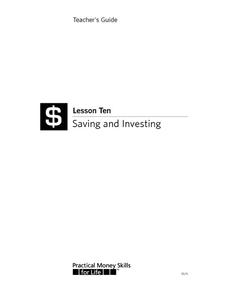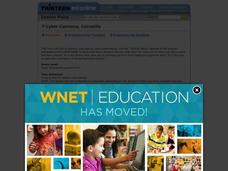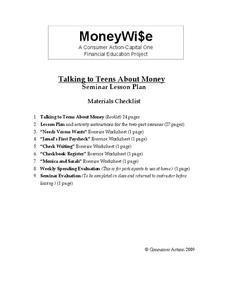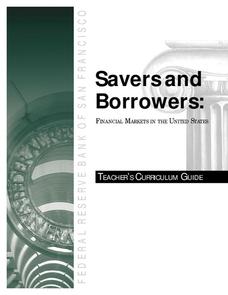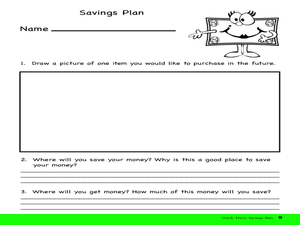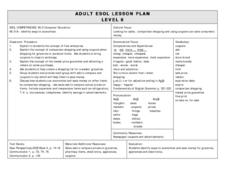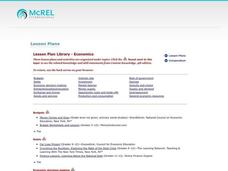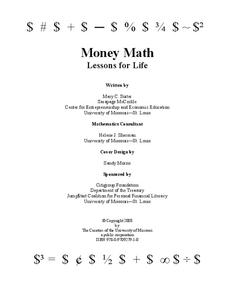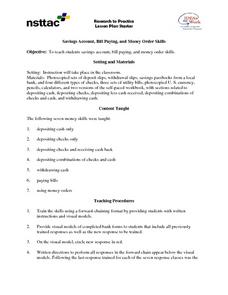Visa
Saving and Investing
Impress upon your young adults the importance of saving and investing, and give them a foundational vocabulary from which they can continue to build their financial literacy. This lesson plan covers short- and long-term budget goals,...
Curated OER
Cyber Currency, Currently
Students explore the value of currency and how to save and earn interest. In a key lesson, kids even get to purchase items in their classroom's general store. It's a fun way to learn the importance of being financially literate!
Curated OER
Saving and Creating a Personal Budget
Fifth graders brainstorm ways to save money. In this financial awareness lesson plan, 5th graders read a chapter from the book, From the Mixed-Up Files of Mrs. Basil E. Frankweiler and create a personal budget for themselves.
Curated OER
Saving Makes Cents
Students identify ways families save money. For this financial lesson, students read the book A Chair for My Mother and discuss ways to save money. Students identify coin values and practice counting money.
Consumer Action
Talking to Teens About Money
Your teenagers are probably very good at spending money, but how good are they at managing it? Teach class members about banking, checking accounts, interest rates, car insurance, and many other relevant concepts with a series of...
Curated OER
Savers & Borrowers: Financial Markets in the United States
Investigate the current financial market and have your class explore savings, borrowing, financial markets, mutual funds, and the stock market. This four-part lesson plan is designed to help students become knowledgeable and informed...
Curated OER
Why We Save
Students discover how to save money. In this financial planning lesson, students read the story Spend or Save? and discuss ways to save money. Students choose a character from the story and write about a financial decision they had to make.
Curated OER
The Hundred Penny Box
Students compare how people save money in financial institutions, after reading the story, The Hundred Penny Box. They analyze the advantages of regular saving and how savings grow with compounding.
Curated OER
Uncle Jed's Barbershop
Fourth graders examine productive resources. In this economics lesson plan, 4th graders read a book about a man who saves money to buy his own barbershop. After reading, students get into groups to play a game to learn about savings.
Curated OER
After 6 Months of Financial Dieting
Explore the concept of financial planning by reading an article about 5 families and their plans to save money. High schoolers discuss the progress each family made financially after three months, and then make their own financial plan.
Visa
Money Matters: Why It Pays to Be Financially Responsible
What does it mean to be financially responsible? Pupils begin to develop the building blocks of strong financial decision making by reviewing how their past purchases are examples of cost comparing, cost-benefit analysis, and budgeting.
Curated OER
Wise Pockets
Using children's picture books and role-playing activities, youngsters begin to learn about personal finance management. These lesson plans are engaging and intend to endow pupils with skills for making wise decisions with money as they...
Curated OER
Having a Savings Plan
Students discover the importance of saving and spending. In this finance lesson, students read the book Kermit the Hermit and discuss the differences between needs and wants. The students complete worksheets concerning money in their...
Curated OER
Thinking About Money
Students evaluate various approaches to spending money.In this spending money literacy lesson, students broaden their financial goals by reading "Alexander Who Used to Be Rich Last Sunday" and "A Chair for My Mother."Students use a Venn...
Curated OER
Money Management Part III: Savings Accounts and Cash vs. Credit
Help your class understand the importance of saving and managing their money. Here is part three to a unit on credit, cash, and savings. Learners discuss savings accounts and the idea that a budget plan can help them avoid costly credit...
Practical Money Skills
Making Decisions
A set of quizzes and assessments would make a great companion to your lesson on making decisions and opportunity risks. Learners watch a PowerPoint before answering multiple choice questions about interest rates, saving money, and the...
Curated OER
Saving Money On Household Items
High schoolers use sale ads to compare and contrast prices on groceries, electronics, appliances and other goods. Working in groups, students brainstorm ways to save money on these items. This lesson is intended for high schoolers...
Curated OER
Budgeting for the Future
Eighth graders determine the net amount of an income for a fictional job. They must determine their net worth minus standard deductions. Students must then determine their monthly budget including, groceries, credit, and rent.
Curated OER
Micro Economics - Personal Budgeting
Learners explore the real world as it relates to money and how people use it. In this money management lesson, students jump into the real world as they role play with money through spending, saving, being married, single, having...
Curated OER
Budgeting Your Financial Resources (The Mint)
Students plan and maintain balanced budgets.
Curated OER
Money Math: Lessons for Life
Students develop a budget for a college student using all of the influences that the student would have. In this budgeting lesson plan, students use real life examples to create a budget spreadsheet. Students read and study...
Curated OER
Savings and Budget
Second graders investigate the concept of developing a budget. In this financial awareness lesson, 2nd graders read the book The Case of the Shrunken Allowance and brainstorm ways they can save and budget money. Students create their own...
Curated OER
Saving and Spending
Students identify the reasons why they believe people save money. After this list, they discuss what they spend their money on and determine if the reasons for saving money change over time. In groups, they use the story of "Uncle Jed's...
Curated OER
Savings Account, Bill Paying, and Money Order Skills
What do you do after you get a paycheck? Help your mildly disabled learners how to bank wisely with a guided-skills activity. They practice cashing checks, withdrawing money, paying bills, and procuring money orders. The entire learning...


